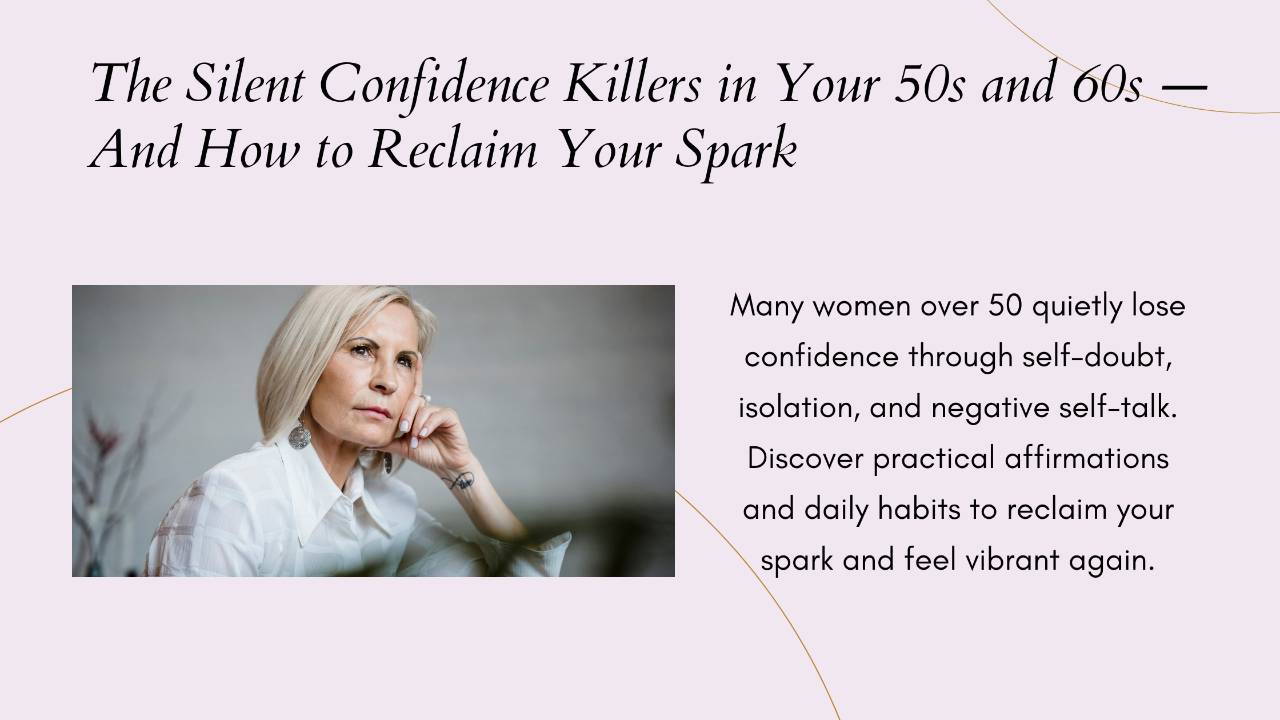The Silent Confidence Killers in Your 50s and 60s — And How to Reclaim Your Spark
Aug 19, 2025
When Lisa turned 60, her confidence level wasn’t what it used to be. After menopause, her body felt different, her energy wasn’t the same, and she started to quietly pull back from her old social circle.
“I don’t have anything to wear that looks good on me,” she thought.
“I don’t know what to talk about now that I’m retired.”
“I’m not sure what I’m even good at anymore.”
Lisa’s story isn’t unusual. I hear it from so many women — and I’ve felt shades of it myself. Confidence doesn’t just disappear overnight, but it can shrink little by little until you start to wonder, Where did my spark go?
The good news: confidence is not gone forever. It’s something you can rebuild, step by step. And it doesn’t take grand gestures — it’s about small, daily moments of showing up for yourself.
3 Silent Confidence Killers
1. Shrinking self-esteem
It often starts with subtle comparisons:
“I’m not as sharp as I used to be.”
“I’m not as fit as I was at 40.”
These thoughts chip away at your self-image, especially in a culture that glorifies youth. But your worth is not defined by wrinkles, gray hair, or how quickly you can run a mile. It’s defined by the wisdom you carry and the presence you bring.
2. Avoiding social situations
When confidence dips, it feels safer to say no than to risk showing up. Maybe you skip the lunch invite, or decide not to attend the book club. Over time, isolation grows, and so does self-doubt.
But connection is fuel. Just last week, I signed up for a local bridge class that starts next month. I don’t know anyone in the class yet, and I’m certainly not an expert — but that’s the point. Trying something new is how we remind ourselves we’re still growing, still curious, still alive.
3. Negative self-talk
The words you say to yourself matter. Phrases like:
“I can’t wear that anymore.”
“I’m too old to try this.”
“I’ll never get back to who I was.”
This kind of self-talk becomes a loop that reinforces fear instead of possibility. But the good news? Your brain can be rewired with new words and new beliefs.
The Hopeful Truth
Confidence isn’t something you either have or don’t have. It’s something you build.
👉 Confidence is built in daily micro-moments.
Each time you show up for yourself, take a deep breath, speak kindly to yourself, or walk into a room with a smile, you’re strengthening that muscle.
Quick Win Practice
Start tomorrow morning with three simple affirmations while you make your tea or coffee:
☕ “I deserve to take up space.”
☕ “My energy is my superpower.”
☕ “Every day I am building strength and joy.”
They may sound simple, but repeated daily, they shift how you see yourself — and how the world sees you.
Lisa began practicing small changes like this, and over time, she found her confidence again. She laughed more, reconnected with friends, and even tried a new hobby she’d been curious about for years.
Confidence isn’t lost with age. It evolves — and when you nurture it, it can grow even stronger. At any age, you can reclaim your spark.
I’d love to know: What’s one thing you’ve done recently that made you feel more confident?
For me, it was signing up for that bridge class at the local community center. It reminded me that saying yes to new experiences is how we keep our spark alive.
Ready for a Deeper Experience?
If you’re a woman 50+ who wants structured support, thoughtful coaching, and real momentum, the Sexy in Your 60s Coaching Experience is now open.
You can learn more about the program here — or join my email list to receive reflections and podcast updates along the way.


